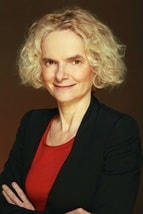We asked Dr. Volkow a few questions to start the conversation before her Keynote Lecture:
What motivated you to go into your particular area of research? Nora Volkow: I went into addiction research because I wanted to understand what happens to the brain of a person that can no longer control his/her desires even though they want to do it. In other words, investigating the neurobiological underpinnings of the balance between neuronal networks involved in desires/emotions and those involved in self-regulation and how drugs influence them in addiction. If you weren't talking to brain mappers or scientists, how would you describe your most proud scientific accomplishment?NV: Providing insight that gave us an explanation of why people who are addicted to drugs cannot stop the strong urges to take the drugs even when this comes at the expense of very catastrophic consequences. If you were speaking to a non-scientist, how would you describe your research and what you do for a living? NV: I would say that, as a brain researcher, I explore how the brain works; and as a researcher studying the effects of drugs, I investigate the mechanisms within our brain that motivate our actions and that underlie free will. What do you think are the most pressing issues in neuroimaging for your area of interest? For the field in general? NV: For the addiction field, I would say, developing an imaging biomarker for substance use disorders that can help predict clinical outcomes, guide tailored interventions for a given patient and help in the development of new therapeutics for substance use disorder, including strategies to help the brain recover. For the field in general, I would say developing magnetic resonance imaging (MRI) with higher temporal and spatial resolution and with higher sensitivity. What do you think is the future of neuroimaging for basic research? For translational research and application? NV: For basic research, optical imaging in conjunction with optogenetics and DREADDs is allowing us to assess the role of specific neuronal types in circuit function. MRI and Positron Emission Tomography (PET) have also allowed us to start to assess the roles of specific gene manipulation on brain function. There are many applications of neuroimaging for translational research, including use of imaging for real life biofeedback interventions to regulate the function of specific brain regions associated with craving or negative moods that lead to relapse; use of imaging for tailoring prevention message on the basis of brain activation responses predictive of behavioral changes; use of imaging to identify individuals at higher risk for substance use disorders; and, as described above, the development of biomarkers to guide clinical treatment and new therapeutics. If you're attending the Annual Meeting in Geneva, come and hear Dr. Volkow’s lecture on Tuesday to learn more about the insights into addiction-related neurochemical and functional changes that are being revealed by brain imaging combined with behavioral measurements and genetics. More information on Dr. Volkow’s work and NIDA can be found at https://www.drugabuse.gov/about-nida/directors-page and you should also check out her blog for the latest in new addiction treatments and her perspective on today’s most important addiction issues.
0 Comments
Your comment will be posted after it is approved.
Leave a Reply. |
BLOG HOME
Archives
January 2024
|

 RSS Feed
RSS Feed